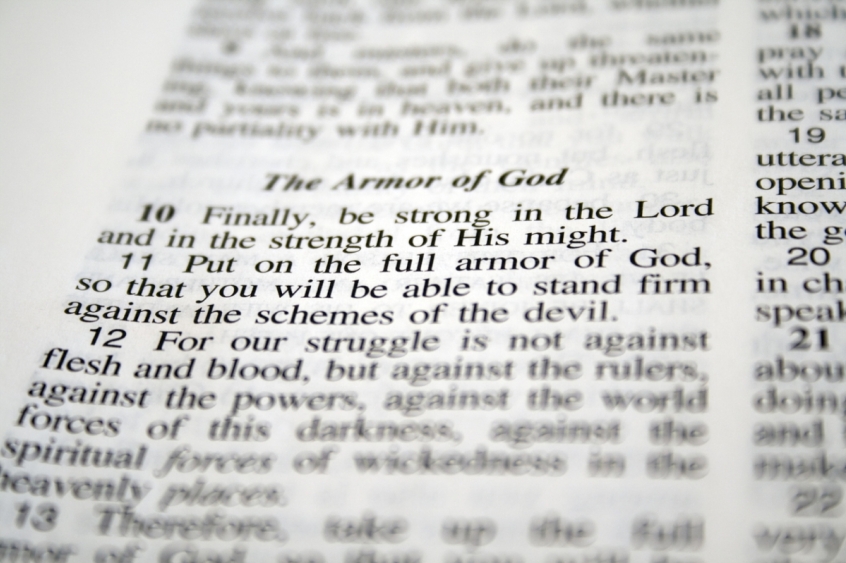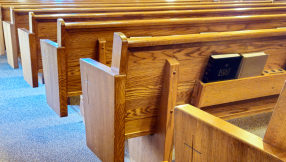
How should orthodox British Christians view the evil that has gripped their nation? From the undermining of the heterosexually married family to rampant drug abuse to largely unchecked criminality to the killing of millions of unborn children, evil seems to have had a pretty free run in this country since the 1960s.
A secular historian writing at the end of the 21<sup>st century might validly identify the social, cultural and political reasons for the decline of Britain leading to its violent Balkanisation by, say, 2050. A perceptive historian might cite the decline of Christianity as a cultural factor in Britain's implosion. But secular history cannot be sacred history of the kind found in Old Testament books such as 1 and 2 Kings and so inevitably the crucial spiritual dimension to the story would be left out.
The New Testament epistle reading in the Book of Common Prayer set for today, the twenty-first Sunday after Trinity, is vital to the Christian's understanding of the workings of evil. The reading is from chapter six, verses 10 to 20, of St Paul's letter to the Ephesians, a passage which Lady Thatcher's granddaughter read out at her funeral service in St Paul's Cathedral in 2013.
The Apostle Paul's final exhortation in his letter to the Christian Church in 1<sup>st century Ephesus begins:
"Finally, my brethren, be strong in the Lord, and in the power of his might. Put on the whole armour of God, that ye may be able to stand against the wiles of the devil. For we wrestle not against flesh and blood, but against principalities, against powers, against the rulers of the darkness of this world, against spiritual wickedness in high places. Wherefore take unto you the whole armour of God, that ye may be able to withstand in the evil day, and having done all, to stand (Ephesians 6 v10-13)."
Paul was drawing his readers' attention to the spiritual forces behind the evils of idolatry, sorcery, gross sexual immorality, violence and greed which they saw in the pagan city in Roman Asia where they lived as a Christian minority.
Those spiritual forces, which Paul described as "principalities. powers, the rulers of the darkness of this world and spiritual wickedness in high places", were also involved in the pull of evil these Christians experienced themselves and against which Paul warned them, particularly in chapters four and five of this epistle.
Heading these unseen spiritual powers of evil at work in the world is the devil or Satan, against whose wiles Paul urged the Christians to stand firm by putting on 'the whole armour of God'.
When Paul stated that "we wrestle not against flesh and blood", he was not suggesting that people are mere puppets being string-pulled by these spiritual forces of evil. Paul consistently taught, in line with the Scriptures, that we wilfully choose to rebel against God and thus take the path of evil. But the spiritual blindness caused by our sinfulness leads to our failure to understand the nature of the evil we have got ourselves into.
Paul countered such ignorance by urging his Christian readers to arm themselves against the spiritual forces of evil at work in a sinful world. Putting on the whole armour of God involved their having their "loins girt about with truth, and having on the breastplate of righteousness" (v14); their "feet shod with the preparation of the gospel of peace" (v15); their "taking the shield of faith, wherewith ye shall be able to quench all the fiery darts of the wicked" (v16); and their taking "the helmet of salvation, and the sword of the Spirit, which is the word of God" (v17).
These various pieces of the spiritual armour of God represent the complementary aspects of the divine message of eternal salvation in the Bible. This revelation makes clear that God calls the Christian to be a person of truth and righteousness; a person who is ready to live by and to share the good news of the forgiveness of all sin through faith in the crucified and risen Jesus Christ; a person who has faithful confidence in Almighty God's power to defeat the forces of evil: and a person who is hopeful of their eternal salvation and relies on the biblical word of God in the spiritual and moral battles they face.
The Collect for today powerfully internalises for the Christian believer his or her need to depend on God against the spiritual forces of evil in this dark world:
"Grant, we beseech thee, merciful Lord, to thy faithful people pardon and peace; that they may be cleansed from all their sins, and serve thee with a quiet mind; through Jesus Christ our Lord."
Julian Mann is a former Church of England vicar, now an evangelical journalist.













